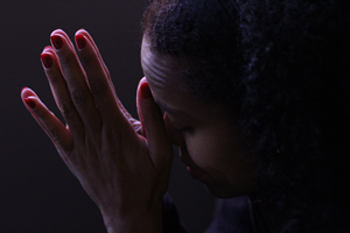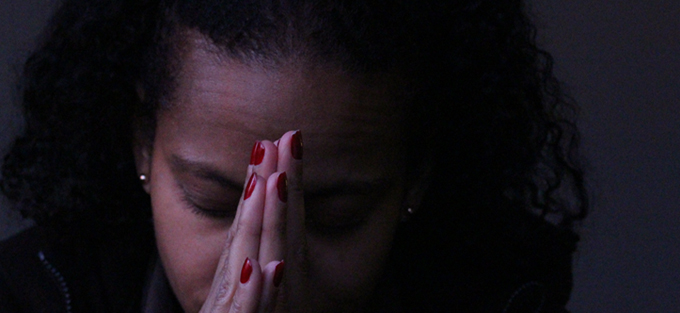by Laura Gentry
I don’t give things up for Lent. Instead, I add something. After all, Lent is not just about fasting; it’s about feasting. The whole reason for giving up something is to make more room for God in our lives — so that we can feast on God’s mercy. Adding a spiritual discipline, I found, is a great way to observe Lent. It can draw you into a heightened awareness of God’s presence in your daily life and truly prepare you for the celebration of Easter.
Over the years, I’ve sampled various disciplines and discovered myriad treasures. Maybe they’ll inspire you to add something this Lent.
1. Make time for God
 It all begins with carving out time for God. Admittedly, this sounds impossible. Our days are so full with so many activities that one more thing on the to-do list just might push us over the edge. But we cannot forget that God is our very source of life — not just one more thing to add to our already-too-full calendar. When we take time for God, we are refueled. It changes the way we perceive our lives and suddenly, all our burdens feel lighter.
It all begins with carving out time for God. Admittedly, this sounds impossible. Our days are so full with so many activities that one more thing on the to-do list just might push us over the edge. But we cannot forget that God is our very source of life — not just one more thing to add to our already-too-full calendar. When we take time for God, we are refueled. It changes the way we perceive our lives and suddenly, all our burdens feel lighter.
Martin Luther used to pray for four hours a day (in addition to the five hours of communal prayer) and it was said that on his busiest days, he would double his prayer time. German theologian Helmut Thieliche wrote: “Luther prayed this much, not despite his busy life, but so he could accomplish his gigantic labors. To work without praying and without listening means only to grow and spread oneself upward, without striking roots and without creating an equivalent in the earth. A person who works this way is living unnaturally.”
2. Devote time to read the Bible
An ancient spiritual practice, lectio divina is a deliberate, contemplative praying of Scripture. This practice has been preserved in the Christian monastic tradition and is now popular across denominations. Lectio divina, which is Latin for “divine reading,” invites us to open our hearts to the living Word, thus enabling us to offer more of our lives to God. In doing so, we throw ourselves into the outpouring of grace where the Savior’s love can reach us.
Lectio divina can be practiced in a group or individually. To begin a solitary session, sit down with your Bible in a quiet place and choose a brief passage, no more than two or three verses. Breathe deeply, relax, and ready yourself to really listen — to absorb God’s Word. Read through the passage and then be still for several minutes, silently ruminating on it.
Is there a word or phrase that sticks in your mind? What feelings does it evoke? How is it speaking directly to you? After spending some time with these questions, re-read the passage again and pause to ruminate and question again. Repeat this process several times. Notice what thoughts emerge. Close the session with prayer and journal about your experience.
3. Pray the Jesus prayer
The early monastics known as the “Desert Fathers and Mothers” and wrote a simple Scriptural prayer called the Jesus Prayer, which they taught pilgrims to pray 3,000 times a day. Advanced students could pray it as many as 12,000 times, which takes virtually all day.
Seekers found it invaluable in their endeavor to pray without ceasing. The prayer is simply: “Lord Jesus Christ, Son of God, have mercy on me, a sinner.” For centuries, believers have used it as a mantra to call upon the powerful name of Jesus and beg him to anoint them with kindness. When used regularly, this prayer becomes as automatic and vital as breathing.
An easy way to begin is to sit comfortably and set a timer for somewhere between five and 20 minutes. Close your eyes and say the Jesus Prayer silently, connecting it with your breath. Continue to breathe the prayer in and out until the timer rings. As other thoughts surface, release them gently and return to the prayer. Another way to pray it is with a walking meditation. Say the prayers as you walk slowly, connecting the rhythm of your steps with your breath and the mantra. The more you use the Jesus Prayer, the more it prays itself within you.
This Lent, I encourage you to try adding a spiritual practice that you may feast upon God’s presence and become more awake to the grace which sustains us at every glorious moment of our lives.
The Rev. Laura Gentry is pastor of Our Savior’s Lutheran Church in Lansing, Iowa. She’s also an artist, motivational speaker and a master teacher of Laughter Yoga. Pastor Gentry directs the Iowa School of Laughter Yoga, which offers seminars, on-line courses and the annual LaughFest of the Midwest. Gentry has presented laughter programs on six continents and developed a number of wellness resources including a book, a film and CDs.
This article is adapted from “Adding something for Lent” by Laura Gentry from the March 2006 issue of Cafe.
Photos by Elizabeth McBride.


Thank you so much for this wonderful Laughter Yoga website. I enjoyed so many of the posts, including the many Flash Mobs!
Uplifting. I like the idea of feasting for Lent as a way of fasting. I will be sharing this with my Bible study group.
Thank you for this motivating article. I’ve never really connect with the practice of giving things up for lent. I relate Jesus suffering to my life sorrows which strengthens me.
Adding one of these practices daily will too. Looking forward to giving one of the a try.